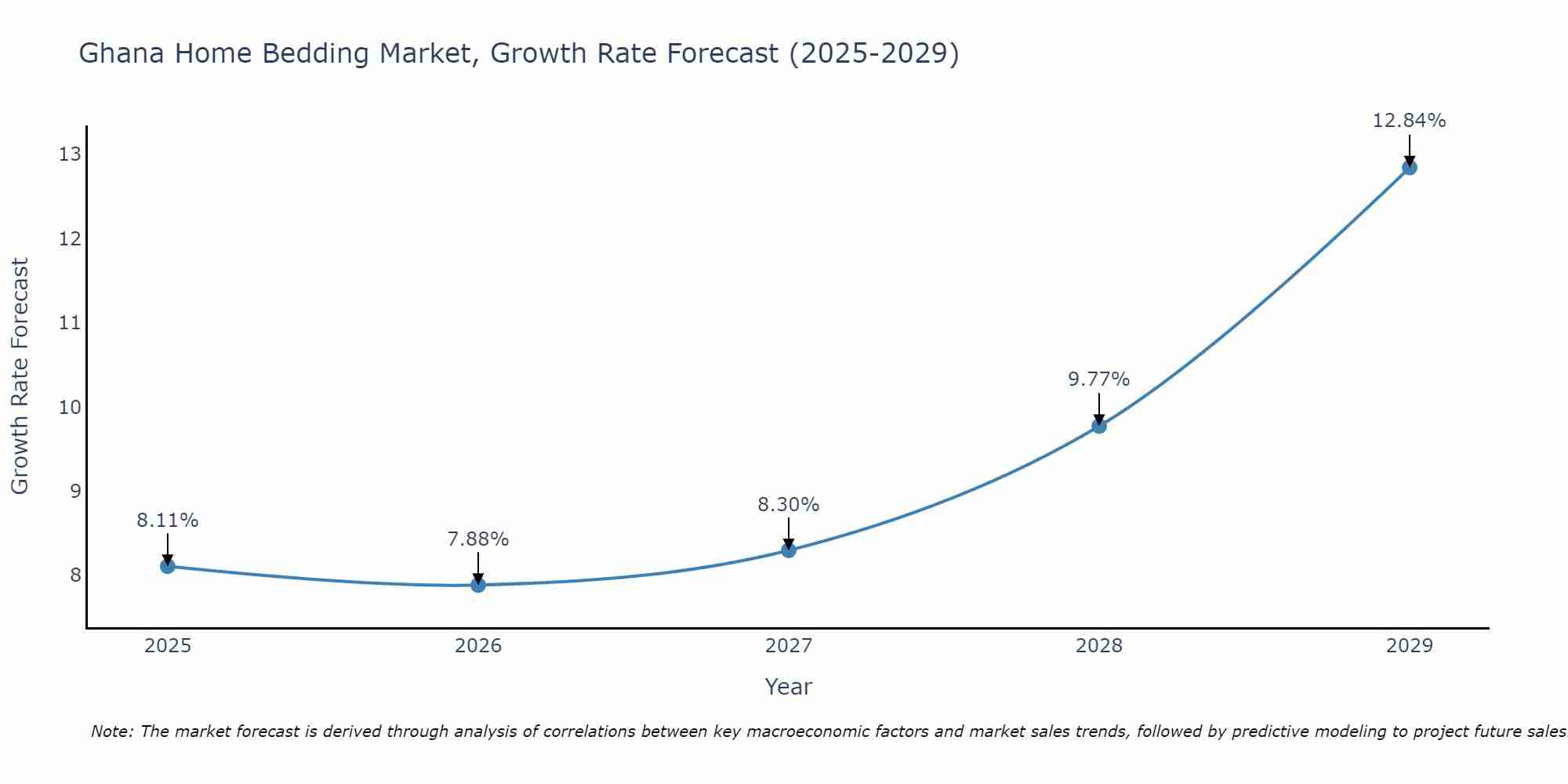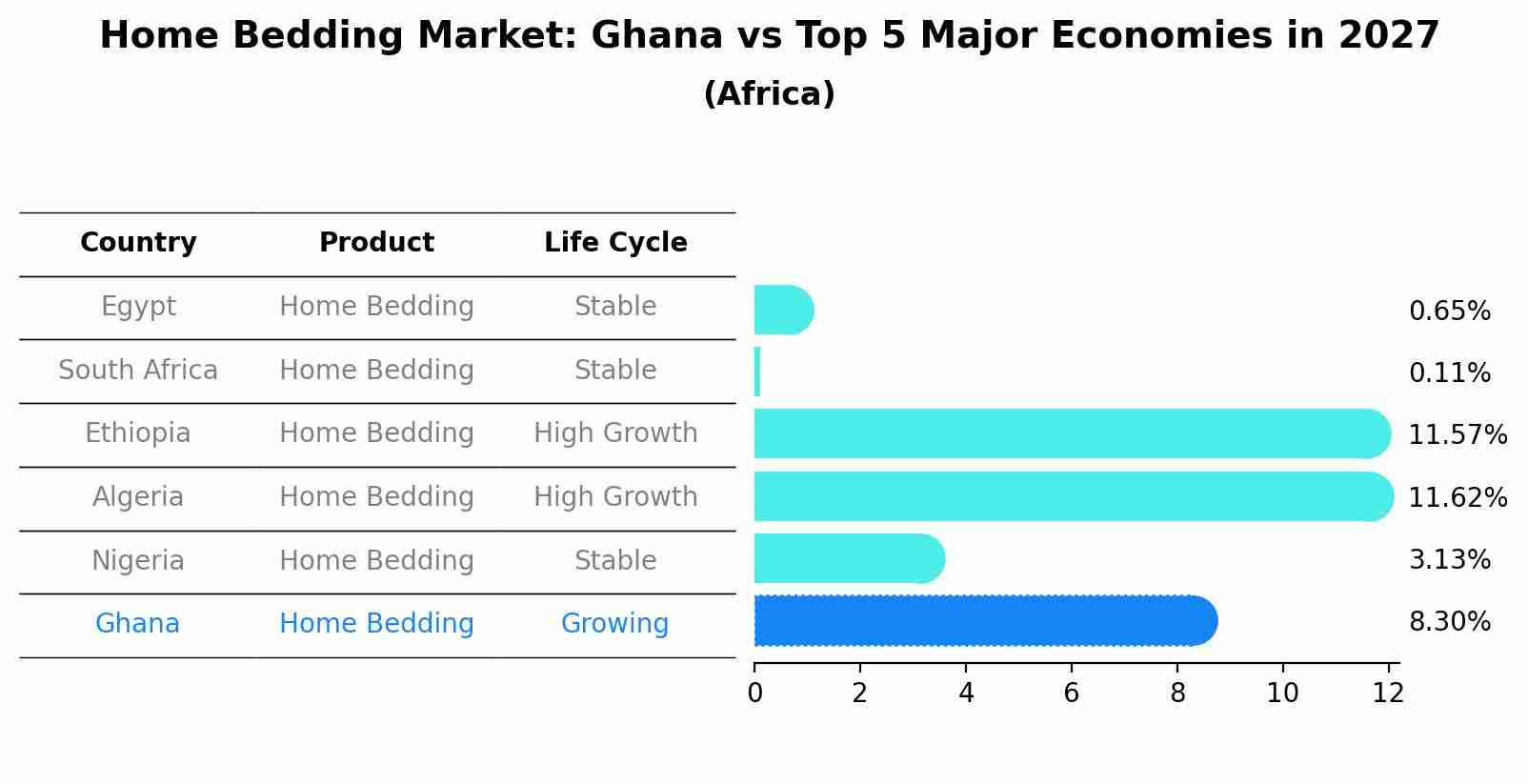Ghana Home Bedding Market (2025-2031) Outlook | Analysis, Size, Revenue, Companies, Industry, Share, Value, Trends, Growth & Forecast
| Product Code: ETC371036 | Publication Date: Aug 2022 | Updated Date: Jul 2025 | Product Type: Market Research Report | |
| Publisher: 6Wresearch | Author: Sachin Kumar Rai | No. of Pages: 75 | No. of Figures: 35 | No. of Tables: 20 |
Ghana Home Bedding Market Size Growth Rate
The Ghana Home Bedding Market is projected to witness mixed growth rate patterns during 2025 to 2029. The growth rate starts at 8.11% in 2025 and reaches 12.84% by 2029.

Home Bedding Market: Ghana vs Top 5 Major Economies in 2027 (Africa)
By 2027, Ghana's Home Bedding market is forecasted to achieve a growing growth rate of 8.30%, with Egypt leading the Africa region, followed by South Africa, Ethiopia, Algeria and Nigeria.

Ghana Home Bedding Market Synopsis
The Ghana home bedding market is experiencing steady growth driven by factors such as increasing disposable income, urbanization, and a growing middle-class population. Consumers are becoming more conscious about the quality and design of bedding products, leading to a rise in demand for premium and luxury bedding items. Traditional bedding materials like cotton and linen remain popular choices among Ghanaian consumers, although there is a growing interest in modern fabrics such as microfiber and bamboo. Key players in the market are focusing on product innovation, sustainability, and customization to cater to evolving consumer preferences. Retail channels such as specialty stores, department stores, and online platforms play a significant role in distribution. Overall, the Ghana home bedding market presents opportunities for both local and international brands to capitalize on the rising demand for quality and stylish bedding products.
Ghana Home Bedding Market Trends
In the Ghana Home Bedding Market, there is a growing preference for high-quality and luxurious bedding products among consumers. There is a noticeable shift towards eco-friendly and sustainable bedding materials, such as organic cotton and bamboo fibers, reflecting a broader global trend towards environmentally conscious purchasing decisions. Additionally, there is an increasing demand for bedding products that offer enhanced comfort and durability, with features like hypoallergenic properties and temperature regulation. E-commerce platforms are playing a significant role in driving the market by offering a wider variety of choices to consumers and convenient shopping experiences. Customization and personalization options are also gaining popularity, allowing consumers to tailor their bedding choices to suit their individual preferences and style preferences. Overall, the Ghana Home Bedding Market is witnessing a shift towards premium, sustainable, and personalized bedding solutions.
Ghana Home Bedding Market Challenges
In the Ghana Home Bedding Market, some key challenges include the presence of counterfeit products, limited access to quality raw materials, and price sensitivity among consumers. Counterfeit products undermine the reputation of genuine brands and can lead to a loss of consumer trust. Additionally, the limited availability of quality raw materials locally often results in higher production costs and reduced competitiveness in the market. Price sensitivity among consumers in Ghana also poses a challenge for bedding manufacturers and retailers, as they must balance offering quality products with affordability to remain competitive. Overall, addressing these challenges requires a focus on quality control, sourcing strategies for raw materials, and developing pricing strategies that cater to the local market`s preferences and purchasing power.
Ghana Home Bedding Market Investment Opportunities
The Ghana Home Bedding Market presents promising investment opportunities due to the country`s growing middle-class population and increasing urbanization rates. With a rising demand for quality bedding products, there is a need for innovative and affordable solutions to cater to the evolving consumer preferences. Investors can explore opportunities in manufacturing and retailing of a wide range of bedding products such as bed linens, pillows, mattresses, and duvets. Additionally, there is potential for introducing eco-friendly and sustainable bedding options to tap into the growing trend of environmentally conscious consumers. Collaborating with local artisans and suppliers can also differentiate offerings in the market. Overall, investing in the Ghana Home Bedding Market offers a chance to capitalize on the country`s demographic trends and consumer demand for comfortable and stylish bedding solutions.
Jordan Agar Market Government Policies
The Ghanaian government has implemented various policies to support the home bedding market, including import regulations and quality standards to ensure consumer safety and promote local manufacturing. The government has also initiated programs to boost the textile and garment industry, which indirectly benefits the home bedding sector. Additionally, efforts have been made to encourage investment in the sector through incentives and tax breaks for manufacturers. The government has shown a commitment to promoting the growth of the home bedding market through policy initiatives that aim to stimulate local production, improve product quality, and create a favorable business environment for industry players.
Ghana Home Bedding Market Future Outlook
The future outlook for the Ghana Home Bedding Market appears promising, driven by factors such as increasing urbanization, rising disposable incomes, and a growing middle-class population. Consumers are becoming more aware of the importance of quality bedding products for a good night`s sleep, leading to a shift towards premium and luxury bedding options. Additionally, the trend of home improvement and interior decoration is gaining traction among Ghanaian households, fueling the demand for aesthetically pleasing and comfortable bedding products. With the influence of global trends and the availability of a wide range of bedding options in the market, the industry is expected to witness steady growth in the coming years, presenting opportunities for both domestic and international bedding brands to expand their presence and cater to the evolving needs of Ghanaian consumers.
Key Highlights of the Report:
- Ghana Home Bedding Market Outlook
- Market Size of Ghana Home Bedding Market, 2024
- Forecast of Ghana Home Bedding Market, 2031
- Historical Data and Forecast of Ghana Home Bedding Revenues & Volume for the Period 2021 - 2031
- Ghana Home Bedding Market Trend Evolution
- Ghana Home Bedding Market Drivers and Challenges
- Ghana Home Bedding Price Trends
- Ghana Home Bedding Porter's Five Forces
- Ghana Home Bedding Industry Life Cycle
- Historical Data and Forecast of Ghana Home Bedding Market Revenues & Volume By Type for the Period 2021 - 2031
- Historical Data and Forecast of Ghana Home Bedding Market Revenues & Volume By Bed Linen for the Period 2021 - 2031
- Historical Data and Forecast of Ghana Home Bedding Market Revenues & Volume By Mattress for the Period 2021 - 2031
- Historical Data and Forecast of Ghana Home Bedding Market Revenues & Volume By Pillows for the Period 2021 - 2031
- Historical Data and Forecast of Ghana Home Bedding Market Revenues & Volume By Blankets for the Period 2021 - 2031
- Historical Data and Forecast of Ghana Home Bedding Market Revenues & Volume By Others for the Period 2021 - 2031
- Historical Data and Forecast of Ghana Home Bedding Market Revenues & Volume By Distribution Channel for the Period 2021 - 2031
- Historical Data and Forecast of Ghana Home Bedding Market Revenues & Volume By Offline for the Period 2021 - 2031
- Historical Data and Forecast of Ghana Home Bedding Market Revenues & Volume By Online for the Period 2021 - 2031
- Ghana Home Bedding Import Export Trade Statistics
- Market Opportunity Assessment By Type
- Market Opportunity Assessment By Distribution Channel
- Ghana Home Bedding Top Companies Market Share
- Ghana Home Bedding Competitive Benchmarking By Technical and Operational Parameters
- Ghana Home Bedding Company Profiles
- Ghana Home Bedding Key Strategic Recommendations
Frequently Asked Questions About the Market Study (FAQs):
- Single User License$ 1,995
- Department License$ 2,400
- Site License$ 3,120
- Global License$ 3,795
Search
Thought Leadership and Analyst Meet
Our Clients
Related Reports
- Afghanistan Rocking Chairs And Adirondack Chairs Market (2026-2032) | Size & Revenue, Competitive Landscape, Share, Segmentation, Industry, Value, Outlook, Analysis, Trends, Growth, Forecast, Companies
- Afghanistan Apparel Market (2026-2032) | Growth, Outlook, Industry, Segmentation, Forecast, Size, Companies, Trends, Value, Share, Analysis & Revenue
- Canada Oil and Gas Market (2026-2032) | Share, Segmentation, Value, Industry, Trends, Forecast, Analysis, Size & Revenue, Growth, Competitive Landscape, Outlook, Companies
- Germany Breakfast Food Market (2026-2032) | Industry, Share, Growth, Size, Companies, Value, Analysis, Revenue, Trends, Forecast & Outlook
- Australia Briquette Market (2025-2031) | Growth, Size, Revenue, Forecast, Analysis, Trends, Value, Share, Industry & Companies
- Vietnam System Integrator Market (2025-2031) | Size, Companies, Analysis, Industry, Value, Forecast, Growth, Trends, Revenue & Share
- ASEAN and Thailand Brain Health Supplements Market (2025-2031) | Strategy, Consumer Insights, Analysis, Investment Trends, Opportunities, Growth, Size, Share, Industry, Revenue, Segments, Value, Segmentation, Supply, Forecast, Restraints, Outlook, Competition, Drivers, Trends, Demand, Pricing Analysis, Competitive, Strategic Insights, Companies, Challenges
- ASEAN Bearings Market (2025-2031) | Strategy, Consumer Insights, Analysis, Investment Trends, Opportunities, Growth, Size, Share, Industry, Revenue, Segments, Value, Segmentation, Supply, Forecast, Restraints, Outlook, Competition, Drivers, Trends, Demand, Pricing Analysis, Competitive, Strategic Insights, Companies, Challenges
- Europe Flooring Market (2025-2031) | Outlook, Share, Industry, Trends, Forecast, Companies, Revenue, Size, Analysis, Growth & Value
- Saudi Arabia Manlift Market (2025-2031) | Outlook, Size, Growth, Trends, Companies, Industry, Revenue, Value, Share, Forecast & Analysis
Industry Events and Analyst Meet
Whitepaper
- Middle East & Africa Commercial Security Market Click here to view more.
- Middle East & Africa Fire Safety Systems & Equipment Market Click here to view more.
- GCC Drone Market Click here to view more.
- Middle East Lighting Fixture Market Click here to view more.
- GCC Physical & Perimeter Security Market Click here to view more.
6WResearch In News
- Doha a strategic location for EV manufacturing hub: IPA Qatar
- Demand for luxury TVs surging in the GCC, says Samsung
- Empowering Growth: The Thriving Journey of Bangladesh’s Cable Industry
- Demand for luxury TVs surging in the GCC, says Samsung
- Video call with a traditional healer? Once unthinkable, it’s now common in South Africa
- Intelligent Buildings To Smooth GCC’s Path To Net Zero


















